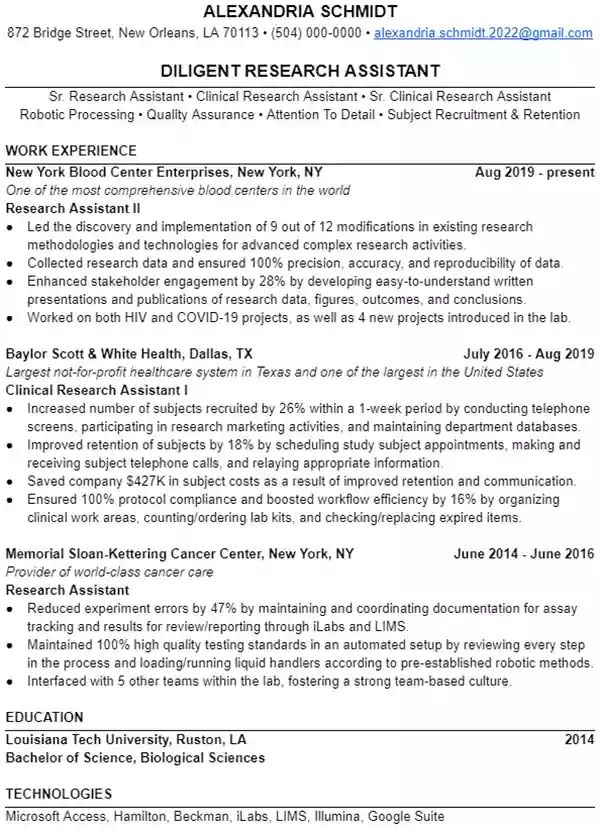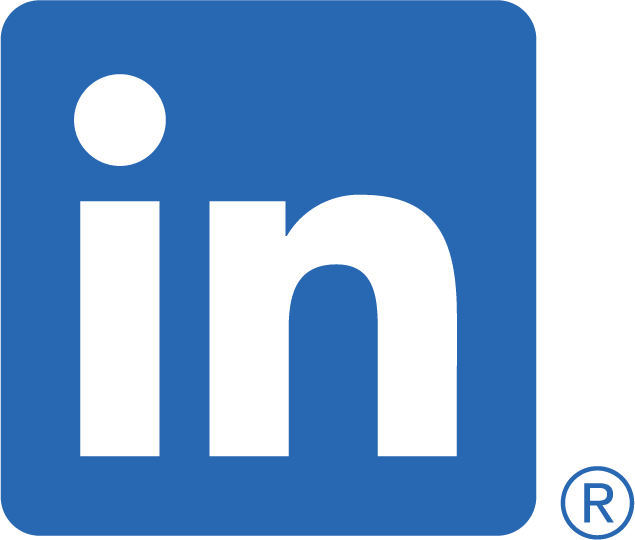Research Assistant Resume Example
A comprehensive guide to writing a great Research Assistant Resume that will get you more interviews and job offers.


How to Write a Research Assistant Resume that Gets Interviews
As a Research Assistant, data is your game.
Whether it’s finding hard-to-find facts and figures, or gathering new data that never existed before, you’re the one to get it done. It’s a details job, and your meticulous nature is the perfect fit.
While writing your resume might seem like a departure from the no-nonsense world of data, it’s actually pretty straightforward.
The best way to look at your resume is to think of it as an advertisement for you. With an outline of a perfect resume template, you can convince a recruiter to call you back for an interview.
Your job is just to supply the data that they want in a predictable and familiar format.
Format for a Research Assistant Resume
There’s actually a systematic approach to writing a stellar resume, which you might appreciate. Here are the six essential components:
- Name + Contact
- Professional Headline
- Summary
- Work Experience
- Education
- Key Words
With this template, you’ll learn how to write a great resume that will improve the likelihood of you being hired for the job of your dreams. Follow along for our step-by-step instruction.
Want someone else to write a resume for you?
Not interested in writing this resume yourself? We get it.
For a free professional research assistant resume that is personalized for you, try Leet Resumes. It’s actually free (though tips are appreciated). {link}
Name + Contact
Let’s start with your name and contact information.
Your name should be at the very top of the page in a font that’s slightly larger than the rest of the text. This isn’t the byline of a group research study, you get to be front and center!
Directly underneath, include your contact information. These days, just your email and phone number are necessary. For in-person lab jobs, a generic location (city and state) is helpful, too.
Just be sure that your contact information is accurate, current, and professional. You don’t want that awkward scenario of spelling out your clever high school email address with your future employer.
Professional Headline
The professional headline is a 3-5 word snapshot of where you are in your career so that a recruiter can immediately see if you’re a good fit for their open position.
Include a positive adjective about your research style like detail-oriented, collaborative, motivated, or similar. Be honest and don’t be afraid to pay yourself a compliment.
Add a word that describes your level of experience like graduate, assistant, senior, etc. And, if you specialize in a specific industry, you can include it here, too.
Again, this is just a snapshot. Don’t worry if you can’t fit everything you want to include in 3-5 words. The goal is to keep your name in the data pool and keep the recruiter reading.
Professional Summary (A.K.A. The Abstract)
Below your headline, is the abstract - or as we like to call it in our resume world, the professional summary.
This is the place to summarize your career as a research assistant so far. Just like an abstract, it’s a high-level summary, but one that includes key takeaways and insights that differentiate you from the average candidate.
In the first 1-2 lines, you’ll include job titles you’re pursuing, and capabilities that show you’re equipped and experienced to take on those roles. Data is your friend, here. List any detailed industry-specific qualifications that let the recruiter know you’re a potential match for their position.
If you’re new to the field, that’s all you really need. The next 1-2 lines are completely optional.
If you’re more experienced, any professional achievements you’ve received for your work can be included in line three, and any career highlights, promotions, or awards for your research work can be added in line 4.
It’s a very systematic approach to writing a resume, but a system that works!
If you’d rather just have someone fill in the blanks for you, try out Leet Resumes. It’s totally free.
Work Experience
The work experience section is the bulk of your resume. Here, you’ll combine a history of your research experience, along with the methods and results of your work.
With your familiarity with data measurement and reporting, this will be a breeze!
First, list your relevant work experience in reverse chronological order. Typically this would be limited to strictly professional experience, but as a research assistant, there might be studies and lab projects you participated in during school that might also be relevant here.
Use your discretion and consider the position you’re applying for. Does your university or graduate experience exhibit relevant skills and results for this job? If so, include it as work experience. If you’re stretching the data to make it relevant, just leave it out.
Once you have a list of your work experience, add bullet point lines underneath each position (no paragraphs!) that highlight the measurable impact of your research contributions.
This is not the place to list your methodology, a synopsis of a project, or research subjects. The recruiter reading your resume as a research assistant is looking for one thing: results.
Here’s how to deliver the data they want:
Use Numbers.
Luckily, you should have a lot of these. Numbers are the best way to translate complicated information or processes into simple understandable vignettes.
The recruiter looking at your resume probably isn’t familiar with the jargon and processes of your work. The data they’re most interested in seeing includes how you contribute to the team, how you support organizational research efforts, and how accurate and efficient your work is.
Find numbers to highlight these areas, and the probability of a callback will shift in your favor.
Use Success Verbs.
Success verbs combine actions with results. They’re words like formulated, collected, forecasted, and analyzed. These verbs will all be tied to measurable outcomes that can highlight your expertise, accuracy, and accomplishment in your field of research.
Highlight the Results.
Finally, stay focused on the results of your individual research contributions. Great result stats to include might be accuracy percentage, results of a published study you contributed to, or how you improved the day to day operations of the lab or organization.
Keep in mind that even though your research work might be highly specialized, the person recruiting you is probably not the lead researcher who’s well-versed in your industry-specific language.
When you’re writing out your research experience, use easy to understand language that is focused on measurable results. Explain your qualifications in a way that’s simple so that anyone can understand the value you add to a company.
You’ll have plenty of time to discuss your amazing qualifications and knowledge in the interview process, but for now, simple and concise is best.
Once that’s done, it’s all smooth sailing from here!
Education
The education section is fairly simple. Include your degrees, educational institutions, and any specific programs of study. Relevant awards, honors, or accolades from these institutions are also appropriate to share.
If you have any incomplete degrees that you’re actively pursuing, it’s okay to list them here. However, if you have any incomplete degrees that you’re not pursuing, just leave them off.
Keywords and Research Assistant Skills for Your Resume
Finally, your research assistant resume is near completion.
In this last section, you’ll list all the relevant skills and keywords that qualify you for the research position you’re targeting.
While you might have a diverse background as a research assistant, be selective with your keywords here and tailor them to meet the expectations of your job recruiter (or the computer scanner that comes before the job recruiter).
The truth is, your resume will be briefly scanned and these keywords are the most efficient way for a recruiter to compare and contrast your keywords to the listed job description. Keep it concise and direct to show off your superb research skills and land you that dream job.
Some keywords to consider include:
- Data Entry
- Lab Maintenance Procedures
- Teamwork
- Statistical Evaluation
- Report Generation
- Sampling
- Organization
- Database Management
- SAS Testing
Don’t forget software that you might think is obvious for your work. This is also the place to include relevant technologies for your research, too. Such as:
- Python
- MATLAB
- CAD
- 3D Printing
- MS Excel
And there you have it! You’ve officially completed your research assistant resume, and have improved the likelihood of interview callbacks.
Congratulations!
Can someone just write my resume for me?
Still feeling stuck writing your own research assistant resume?
That’s quite alright. Leet Resumes will write a professional resume for you at no cost at all (although tips are much-appreciated). Try it out and get your free resume!










